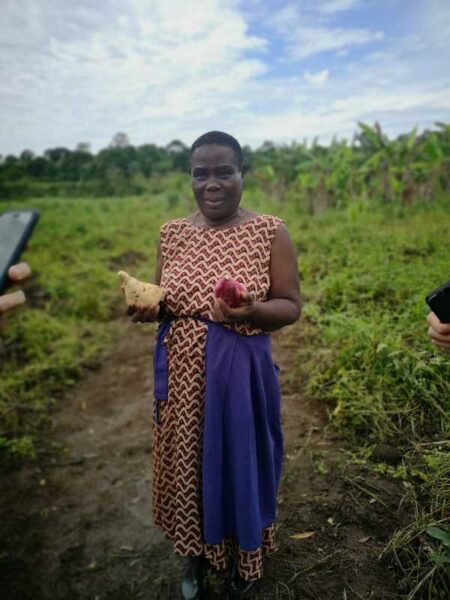
Walker Institute is acutely aware of the disproportionate impact of climate change on women across the world: in particular in the Global South, where multiple vulnerabilities meet to be further exacerbated by weather events and longer-term climate variability. This International Women’s Day, 8 March 2023, we hope to raise awareness of the risks faced by women as the climate crisis deepens, and to Embrace Equity along with our colleagues and partners around the world.
The world is likely to breach the Paris Agreement’s lower limit of 1.5C for at least one year within a decade. Extreme heatwaves, drought and devastating flooding (such as that seen in Pakistan last year) affects millions of people and costs billions of dollars. The poorest communities and women are paying the heaviest price. The Global Gender Gap Index, released by the World Economic Forum, looks at countries in terms of gender inequalities: highlighting the already difficult position in society, and in economic life, faced by women across the world. Climate change intensifies these gender differences, with women more vulnerable to climate hazards, livelihood shocks and health issues.
This vulnerability stems from women being more dependent on natural resources than men, and from a cultural norm that sees women excluded from information sharing, decision making and access to finance. This is especially true in the least developed countries, where there is typically a higher proportion of women working in agriculture: a sector profoundly affected by the impacts of climate and environmental change, such as extreme heat, biodiversity loss and water shortages.
Added to this, when shocks occur, women are often not entitled to compensation and are less able to access credit and financial services. On top of this, it has been observed universally that, when times are hard, the likelihood is that women will reduce their food intake in favour of feeding their families. This adds to their vulnerability to ill health, making them still less resilient to climate change and the accompanying risks of disease and food scarcity.
For example, In drought conditions like in 2021, women involved in agriculture in the Hawizeh marshes of Iraq needed to search for other sources of water in distant areas to provide for families and livestock. When livelihoods deteriorate, men are the first to migrate to cities in search of jobs, leaving women in rural areas to support their families and livestock, adding to their workload, distress and marginalisation.
As the climate warms, it is likely that people will need to diversify their livelihoods to cope with changing weather conditions. However, for many women around the world, this is made harder by both limited education opportunities and limited access to climate data and early warnings. . Globally, there are many schemes aimed at raising the profile of women and encouraging entrepreneurship and education, but there is still a long way to go before women have any measure of equality, particularly in resilience to climate impacts.
Our project in Iraq, funded by the Green Climate Fund, is part of the UN Environment Programme (UNEP) contribution to the delivery of climate change adaptation through the support to the development of its National Adaptation Plan (NAP). Building local adaptive capacity in Iraq whilst contributing to the mainstreaming of regional and national adaptation efforts and understanding of climate change risks is a key component of increasing resilience across the country: understanding and addressing gender parity in such projects is fundamental to their impact.
Considering climate change within the context of the Sustainable Development Goals (SDGs), Walker Director – Ros Cornforth – reflects that, left unchecked, climate change will undermine progress towards the SDGs as tackling the climate emergency also tackles the fundamental problem of development. For example, the development of clean, cheap renewable energy and how this impacts health, education and food security. Indeed the SDGs are intimately connected, and success in addressing the climate emergency underpins them all. If we do not address climate change, the very fabric of the SDGs falls apart and, again, it is women who will feel this most severely.
Of course, the climate crisis is about people, but it affects different people and places unevenly. In this way, it exacerbates inequalities and unequal development, and we see evidence of this all around us. In particular, in the ways it affects women.
Bringing global and local information together in a consistent way is vital. This is why Walker’s global approach to research is framed around My Climate Risk and were appointed by the World Climate Research Programme as one of 8 regional MCR hubs globally (https://www.wcrp-climate.org/mcr-hubs).
My Climate Risk makes explicit the need to embed climate risk within a particular local and social context. This requires a transformation in how scientists work – becoming more interdisciplinary in their thinking and working within multi-disciplinary, multi-sectoral ‘communities of practice’ embedding the local-to-national decision-scale at the heart of risk and resilience research.
Walker echoes the organisers of International Women’s Day in saying: “We can all challenge gender stereotypes, call out discrimination, draw attention to bias, and seek out inclusion. Collective activism is what drives change. From grassroots action to wide-scale momentum, we can all embrace equity.”
This International Women’s Day, the team at Walker invites you to get in contact to discuss how we can improve outcomes for women globally against the backdrop of a changing climate, and Embrace Equity together.
Please contact us info@walker.ac.uk

